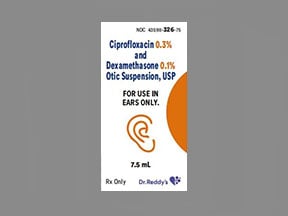
Ciprofloxacin-dexamethasone Coupons & Savings Card – Discount Prices from $54.47
Generic for: Ciprodex
My prescription
Edit
7.5ML of 0.3-0.1%, Ciprofloxacin-dexamethasone (1 Bottle)
Select pharmacy

CVS
$54.47
COUPON PRICE
Walmart
$72.60
COUPON PRICE
Walgreens
$72.70
COUPON PRICE
Albertsons
$80.11
COUPON PRICECiprofloxacin-dexamethasone savings card
Show this card to your pharmacist
CVS
$54.47
BIN
ID
PCN
GRP
019876
LH797665BB
CHIPPO
LHX
Powered by
More prescriptions for ear infection
More prescriptions for ear infection
Price history for Ciprodex (brand) & Ciprofloxacin-dexamethasone (generic)
1 Bottle, 7.5ML of 0.3-0.1%
Average retail price for Ciprodex
Average retail price for Ciprofloxacin-dexamethasone
Average SaveHealth price for Ciprofloxacin-dexamethasone
Our price history data is based on aggregated prescription data collected from participating pharmacies in America. Our prescription data updates daily to reflect the latest price changes. If you notice a missing data point, it means there wasn't sufficient data available to generate a monetary value for that date.
We analyzed Ciprofloxacin-dexamethasone prices for (7.5ML of 0.3-0.1%, 1 Bottle) over the last 12 months. The average retail price was $285.76, while the average price using the SaveHealth discount card was $87.87. That's a savings of approximately 69.25% when using our Ciprofloxacin-dexamethasone coupon.
Compared to the generic version, Ciprodex had an average price of $306.90 over the same time period. With the SaveHealth savings card, Ciprofloxacin-dexamethasone is 71.37% cheaper on average than Ciprodex.
*Retail prices are based on pharmacy claims data, and may not be accurate when we don't have enough claims.
Ciprofloxacin-dexamethasone dosage forms
Dosage Quantity Price from Per unit 7.5ML of 0.3-0.1% 1 Bottle $54.47 $54.47 7.5ML of 0.3-0.1% 2 Bottles $90.64 $45.32 7.5ML of 0.3-0.1% 3 Bottles $126.80 $42.27
| Dosage | Quantity | Price from | Per unit |
|---|---|---|---|
| 7.5ML of 0.3-0.1% | 1 Bottle | $54.47 | $54.47 |
| 7.5ML of 0.3-0.1% | 2 Bottles | $90.64 | $45.32 |
| 7.5ML of 0.3-0.1% | 3 Bottles | $126.80 | $42.27 |
